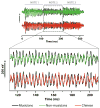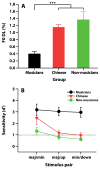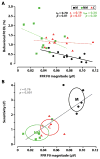Musicians and tone-language speakers share enhanced brainstem encoding but not perceptual benefits for musical pitch
- PMID: 21835531
- PMCID: PMC3159732
- DOI: 10.1016/j.bandc.2011.07.006
Musicians and tone-language speakers share enhanced brainstem encoding but not perceptual benefits for musical pitch
Abstract
Behavioral and neurophysiological transfer effects from music experience to language processing are well-established but it is currently unclear whether or not linguistic expertise (e.g., speaking a tone language) benefits music-related processing and its perception. Here, we compare brainstem responses of English-speaking musicians/non-musicians and native speakers of Mandarin Chinese elicited by tuned and detuned musical chords, to determine if enhancements in subcortical processing translate to improvements in the perceptual discrimination of musical pitch. Relative to non-musicians, both musicians and Chinese had stronger brainstem representation of the defining pitches of musical sequences. In contrast, two behavioral pitch discrimination tasks revealed that neither Chinese nor non-musicians were able to discriminate subtle changes in musical pitch with the same accuracy as musicians. Pooled across all listeners, brainstem magnitudes predicted behavioral pitch discrimination performance but considering each group individually, only musicians showed connections between neural and behavioral measures. No brain-behavior correlations were found for tone language speakers or non-musicians. These findings point to a dissociation between subcortical neurophysiological processing and behavioral measures of pitch perception in Chinese listeners. We infer that sensory-level enhancement of musical pitch information yields cognitive-level perceptual benefits only when that information is behaviorally relevant to the listener.
Copyright © 2011 Elsevier Inc. All rights reserved.
Figures





Similar articles
-
Enhanced brainstem encoding predicts musicians' perceptual advantages with pitch.Eur J Neurosci. 2011 Feb;33(3):530-8. doi: 10.1111/j.1460-9568.2010.07527.x. Epub 2010 Dec 29. Eur J Neurosci. 2011. PMID: 21198980 Free PMC article.
-
Musicians demonstrate experience-dependent brainstem enhancement of musical scale features within continuously gliding pitch.Neurosci Lett. 2011 Oct 10;503(3):203-7. doi: 10.1016/j.neulet.2011.08.036. Epub 2011 Aug 30. Neurosci Lett. 2011. PMID: 21906656 Free PMC article.
-
Cross-domain effects of music and language experience on the representation of pitch in the human auditory brainstem.J Cogn Neurosci. 2011 Feb;23(2):425-34. doi: 10.1162/jocn.2009.21362. Epub 2009 Nov 19. J Cogn Neurosci. 2011. PMID: 19925180
-
Experience-dependent plasticity in pitch encoding: from brainstem to auditory cortex.Neuroreport. 2012 May 30;23(8):498-502. doi: 10.1097/WNR.0b013e328353764d. Neuroreport. 2012. PMID: 22495037 Free PMC article. Review.
-
The role of the auditory brainstem in processing linguistically-relevant pitch patterns.Brain Lang. 2009 Sep;110(3):135-48. doi: 10.1016/j.bandl.2009.03.005. Epub 2009 Apr 14. Brain Lang. 2009. PMID: 19366639 Free PMC article. Review.
Cited by
-
Behavioral and subcortical signatures of musical expertise in Mandarin Chinese speakers.PLoS One. 2018 Jan 4;13(1):e0190793. doi: 10.1371/journal.pone.0190793. eCollection 2018. PLoS One. 2018. PMID: 29300756 Free PMC article.
-
Musical experience, auditory perception and reading-related skills in children.PLoS One. 2013 Sep 24;8(9):e75876. doi: 10.1371/journal.pone.0075876. eCollection 2013. PLoS One. 2013. PMID: 24086654 Free PMC article.
-
Musical Training for Auditory Rehabilitation in Hearing Loss.J Clin Med. 2020 Apr 8;9(4):1058. doi: 10.3390/jcm9041058. J Clin Med. 2020. PMID: 32276390 Free PMC article.
-
Neural Correlates of Early Sound Encoding and their Relationship to Speech-in-Noise Perception.Front Neurosci. 2017 Aug 25;11:479. doi: 10.3389/fnins.2017.00479. eCollection 2017. Front Neurosci. 2017. PMID: 28890684 Free PMC article.
-
An ERP study of good production vis-à-vis poor perception of tones in Cantonese: implications for top-down speech processing.PLoS One. 2013;8(1):e54396. doi: 10.1371/journal.pone.0054396. Epub 2013 Jan 16. PLoS One. 2013. PMID: 23342146 Free PMC article.
References
-
- Anvari SH, Trainor LJ, Woodside J, Levy BA. Relations among musical skills, phonological processing and early reading ability in preschool children. Journal of Experimental Child Psychology. 2002;83(2):111–130. - PubMed
-
- Bent T, Bradlow AR, Wright BA. The influence of linguistic experience on the cognitive processing of pitch in speech and nonspeech sounds. Journal of Experimental Psychology: Human Perception and Performance. 2006;32(1):97–103. - PubMed
-
- Besson M, Schon D, Moreno S, Santos A, Magne C. Influence of musical expertise and musical training on pitch processing in music and language. Restorative Neurology and Neuroscience. 2007;25(3–4):399–410. - PubMed
-
- Bidelman GM, Gandour JT, Krishnan A. Cross-domain effects of music and language experience on the representation of pitch in the human auditory brainstem. Journal of Cognitive Neuroscience. 2011;23(2):425–434. - PubMed
Publication types
MeSH terms
Grants and funding
LinkOut - more resources
Full Text Sources
Medical

